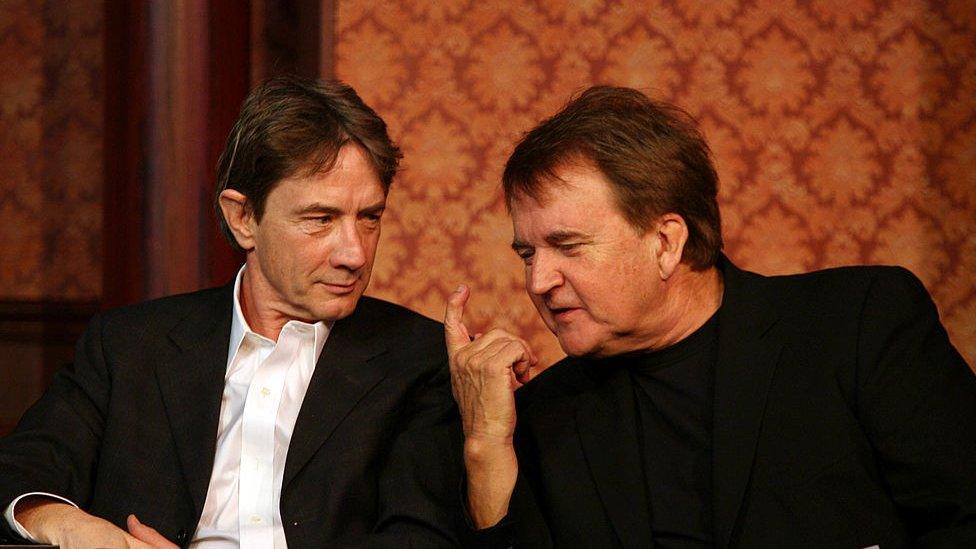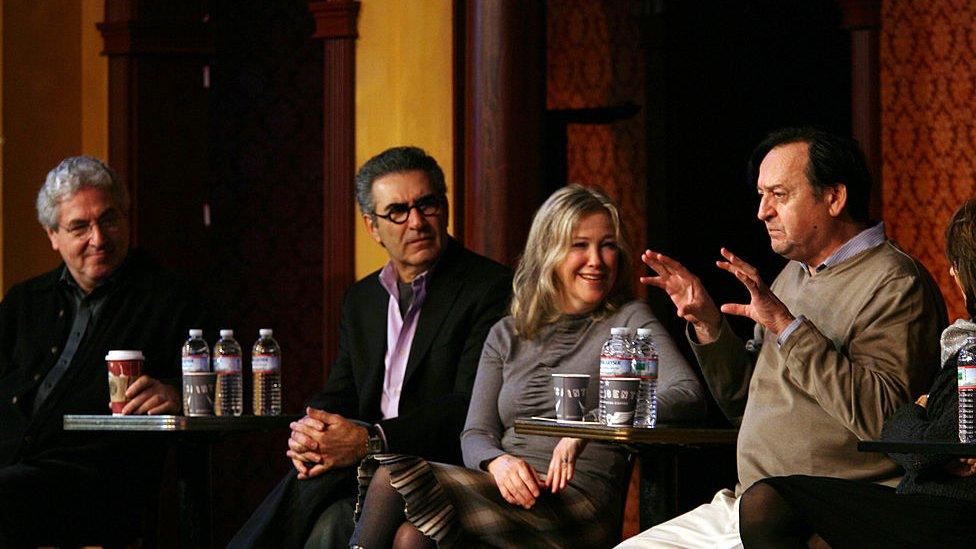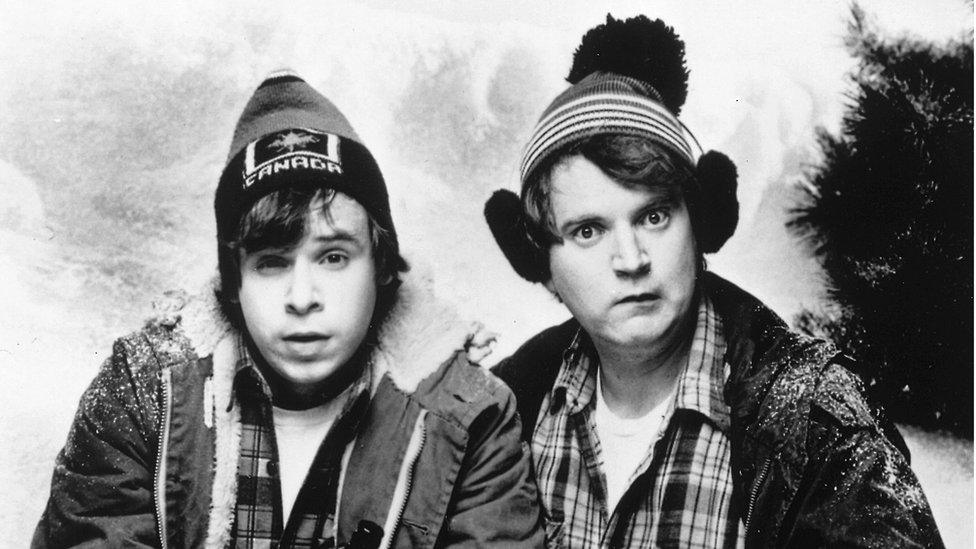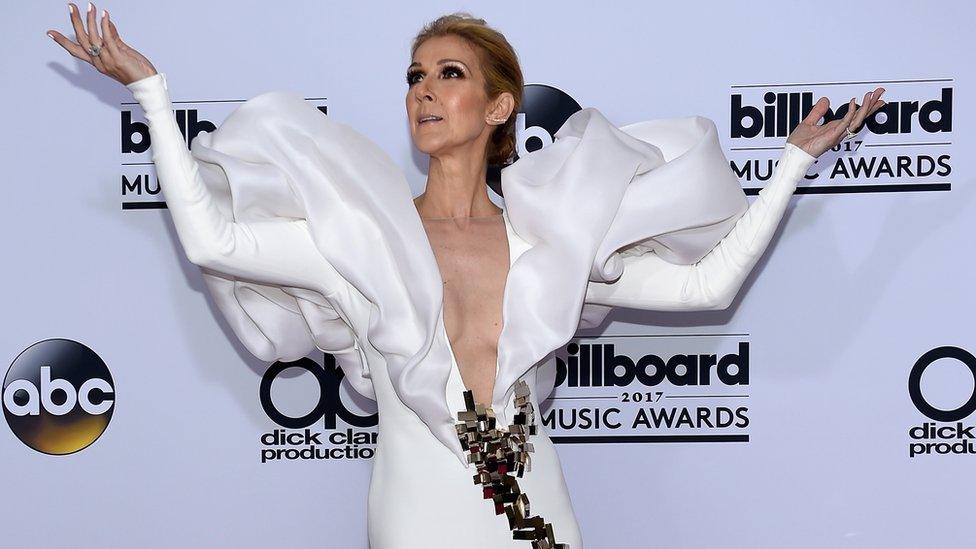How Dave Thomas created the classic Canadian stereotype
- Published

Dave Thomas (right) with his friend and SCTV alum Martin Short.
When Dave Thomas first used the word "hoser" on television more than 35 years ago, he had no idea he'd be creating the classic Canuck stereotype. Now set to reprise his role as one half of the McKenzie brothers, he reflects back on what makes Canada funny in the US.
Dave Thomas learned one of the most valuable lessons in showbiz early on, before he ever got to Hollywood - there really is no sure-fire way to predict a hit.
But a hit is exactly what Thomas and his co-star Rick Moranis had when they debuted the McKenzie brothers on the classic Canadian sketch show SCTV in 1980.
"You can never really predict what the audience is going to embrace," the veteran comedian and writer told the BBC from his home in Los Angeles.
"If we had tried to create something that we thought the audience was going to love, we probably would have failed miserably."
The sketch, which featured two brothers, Doug and Bob McKenzie, sitting in front of a map of Canada, drinking beer and shooting the breeze with accents as thick and sticky as maple syrup, would go on to spawn a comedy album, a film, commercials and even a children's cartoon.
But despite the brothers' enduring popularity, neither he nor the semi-retired Moranis had any intention of bringing the characters back to the screen, let a lone the stage. That is, Thomas says, until his nephew Jake Thomas suffered a tragic snowmobiling injury that left him paralysed from the waist down and unable to support his family.
"When I told [Moranis] the tragic story of my brother's kid, he just kind of melted. He said 'I'll do whatever you want, I'll even put on the toques and the parkas.' It was a very sweet and generous response on his part, and it's definitely not something he wants to do," Thomas says.

Harold Ramis, Eugene Levy, Catherine O'Hara and Joe Flaherty attend an SCTV panel discussion in celebration of the 50th anniversary of Second City
The pair are reviving their characters at their old stomping grounds, The Second City, on 18 July in Toronto for a fundraiser to benefit his nephew's family and Spinal Cord Injury Ontario.
They will be joined by a star-studded cast featuring Mr Thomas's friend and former Second City alum Dan Aykroyd, former SCTV costars Martin Short, Catherine O'Hara, Eugene Levy and Joe Flaherty, as well as The Kids in the Hall stars Dave Foley, Scott Thompson and Kevin McDonald.
"You really find that your friends are these extremely generous and wonderful people, and they're constantly surprising you with the wonderful things that they do," Thomas says.
The fundraiser's astonishingly talented roster is a reminder of the outsized role that Canada has played in comedy history. From Mike Myers to Seth Rogen, Canadians have a knack for getting laughs south of the border, Thomas says.
"I always thought of it metaphorically that it is a fact that 90% of Canadians live within 100 miles of the US border. And I always pictured it in my mind like bleachers lined up along the US border, eating popcorn and watching the crazy show that goes on down south," he says.
"I think that gives Canadians a kind of objectivity of humour that lends itself particularly well to satire."
Hasan Minhaj: 'There's something amazing in the chai'
Thomas honed his own satirical objectivity by moving around quite a bit with his father, a Welsh professor of philosophy, and his Scottish mother. After spending parts of his childhood living in Durham, North Carolina and the United Kingdom, he returned to Canada in his teens in the 1960s, which he found a veritable paradise compared to post-war Britain and the rural US South.
"When I was in third grade in Durham, they took our whole class on a trip to a cigarette factory down there, and at the end of the tour they gave every kid a carton of cigarettes," he says.
"You know, a lot of people think of Canada as kind of colonial and provincial today, but my experience of Canada was that it had all this stuff and sophistication that the other places I was didn't have."
In hindsight, it's rather funny that the kid who loved Canada for its urbanity would help spread the stereotype of the Canadian yokel around the globe. Bob and Doug McKenzie's liberal use of the word "eh," their love of back bacon and their single-minded pursuit of beers helped create the de-facto template for all Canuck jokes, from South Park's Terrance and Philip to Robin Sparkles on How I Met Your Mother.
Heck, the term "hoser" wasn't even a part of the lexicon before Thomas used it on television. He created the noun from the verb "to hose", which was popular slang in Canada when Thomas was growing up in the 1950s.
"I gave that guy 10 bucks and he hosed me! I never got what I paid for," Thomas says to illustrate the proper use of the verb, slipping into Doug's patois without skipping a beat.

Bob and Doug McKenzie
But like so many of his fellow Canucks, when Bob and Doug hit it big, Thomas heads out to Hollywood.
Since leaving SCTV he has co-starred in the ABC sitcom Grace Under Fire, done voice-over work for the Simpsons and Anamaniacs and created an animation studio Animax Entertainment. Recently, he's stretched his creative muscles as a writer on a number of primetime dramas, notably Bones and The Blacklist.
"I'm a showbiz guy, and showbiz is mostly in LA. I would have stayed in Canada but there wasn't enough going on," he said.
Although Bob and Doug were originally conceived to make fun of Canada's strict "Canadian content" laws, which require television stations to broadcast a certain amount of Canadian programmes, he does believe more needs to be done to develop the industry at home.
This spring, Canada's broadcasting regulator cut the amount of "national interest" content required for many television stations, which has Thomas worried about the future of Canadian TV.
"Canadians can do a show that's distinctively Canadian than Americans will embrace," he says.
And he has the toque to prove it.
- Published9 July 2017

- Published29 June 2017
